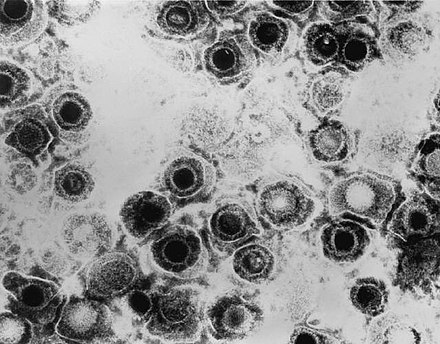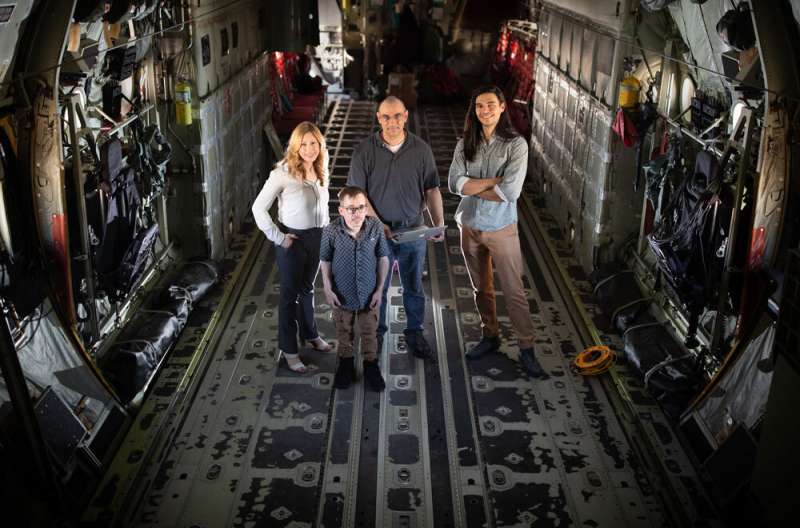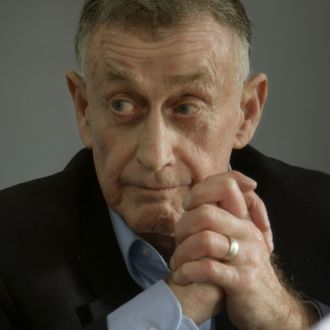There are about 8 billion people living on the planet and over 4 billion people are living with the herpes simplex virus (HSV).
HSV causes a viral disease which sometimes comes with episodes of painful symptoms.
According to World Health Organisation (WHO)’s fact sheet, “an estimated 3.7 billion people under age 50 (67%) have HSV-1 infection globally… 491 million people aged 15–49 (13%) worldwide have HSV-2 infection.”
HSV currently has no cure and raises the risks of acquiring other infections such as the human immunodeficiency virus (HIV).
READ ALSO: Sore Throat, Cough and Fever Could Be Signs You Have Diphtheria, a New Bacteria Infection of Public Concern
WHAT IS HSV?
TEM micrograph of virions of a herpes simplex virus species PHOTO CREDIT: Wikipedia
HSV is a very common infection causing contagious sores affecting the genitals and parts of the mouth or hands. While HSV type 1 (HSV-1) affects the mouth, HSV type 2 (HSV-2) typically affects the genitals.
An unaffected person can contract HSV through physical contact with the affected areas on an infected person’s body.
HSV can cause painful blisters at the site of infection, but not every infected person exhibits these symptoms. In some patients, the symptoms surface periodically.
Some infected persons don’t suffer symptoms, so they may not know that they have been infected.
READ ALSO: Aspirin Linked to Deadly Brain Disease in Children
SIGNS AFTER INFECTION
Although many people do not have obvious signs, the usual signs of HSV infection are blisters and sores forming at the infected location.
According to WHO, many infected persons could experience a tingling, itching or burning sensation around their mouth before the sores and blisters emerge.
“Genital herpes can be asymptomatic or have mild symptoms that go unrecognized. When symptoms occur, genital herpes is characterised by one or more genital or anal blisters or ulcers. Additionally, symptoms of a new infection often include fever, body aches and swollen lymph nodes,” the WHO fact sheet states.
“After an initial episode, which can be severe, symptoms may recur. Genital herpes caused by HSV-1 typically does not recur frequently. With HSV-2, recurrent symptoms are common. However, recurrences are often less severe than the first episode and tend to decrease over time.”
RISK OF INFECTION
 HSV-1 blister. PHOTO CREDIT: Brittanica
HSV-1 blister. PHOTO CREDIT: Brittanica
WHO states that every person in contact with infected surfaces risks contracting HSV.
HSV is mostly transmitted with the body fluids (saliva or discharge) of infected persons. Infected persons can transmit HSV-1 by kissing uninfected persons while HSV-2 can be contracted through sexual intercouse.
HSV-1 carriers can still contract HSV-2. Anyone affected by HSV-2 can also be at risk of contracting HSV-1.
Infants and unborn babies can be at risk of HSV infection. WHO refers to this condition as neonatal herpes.
“Neonatal herpes can occur when an infant is exposed to HSV during delivery. Neonatal herpes is rare, occurring in an estimated 10 out of every 100,000 births globally. However, it is a serious condition that can lead to lasting neurologic disability or death. The risk for neonatal herpes is greatest when a mother acquires HSV for the first time in late pregnancy.”
More complications of HSV include brain infections, meningoencephalitis and encephalitis, and an eye infection known as keratitis.
READ ALSO: Brain-Eating Amoeba Kills Man Who Rinsed Nose With Infected Water
PREVENTION
WHO advises that people who know or suspect they have HSV should abstain from sexual activity and avoid sharing objects with a residue of body fluid.
This means that people must avoid using objects that could have saliva or discharge left on surfaces. While some experience symptoms, other carriers of HSV don’t show symptoms.
People who may be at risk of infection must see a doctor.
WHO also advises pregnant women with symptoms of HSV to inform their health care providers.
TREATMENT
HSV, like HIV, does not have a cure. There are a few medications that can help to treat HSV signs and reduce the severity of symptoms.
WHO lists acyclovir, famciclovir and valacyclovir as the “most effective medications for people infected with HSV”.
Health care providers can choose the best antiviral drug to help reduce the frequency and severity of HSV symptoms. This varies from one patient to the other.
Discovered on: 2023-03-12 17:30:32
Source: HSV, the Incurable Sexually Transmitted Disease Half of the World Has Contr…



